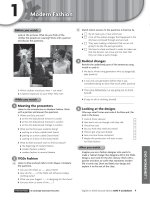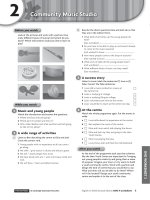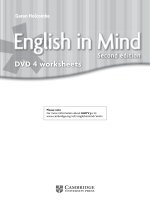EiMTV 4 1
Bạn đang xem bản rút gọn của tài liệu. Xem và tải ngay bản đầy đủ của tài liệu tại đây (530.05 KB, 2 trang )
1
Modern Fashion
Before you watch
Look at the pictures. What do you think of the
clothes the people are wearing? Work with a partner
and discuss the questions.
b
Match Colin’s answers to the questions in Exercise 2a.
a
b
c
d
By all means yes, I have some here.
A lot of the radical changes that happened in the
20s have continued through and survived.
They were making a statement that we are not
going to be like the past generation.
We have to cheat and bend in order to make sure
that the dancers can move and not least that
they can make a quick change.
3 Radical changes
Rewrite the underlined parts of the sentences using
would or used to.
1 Which clothes would you wear / not wear?
2 Is fashion important to you? Why? Why not?
While you watch
1 Meeting the presenters
Listen to the introduction to Modern Fashion. Work
with a partner and answer the questions.
1 Where are Elsie and Josh?
a at the Arts Educational School in London
b at the Arts Educational Institute in London
c at the Arts Educational College in London
2 What are the final year students doing?
a putting on a show called Hotel Grand
b putting on a show called Grand Hotel
c putting on a show in the Grand Hotel
2 1920s fashion
a
Listen to Elsie and Josh talk to Colin Mayes. Complete
the questions.
4 Looking at the designs
Who says what? Listen and write E for Elsie and J for
Josh in the boxes.
1
2
3
4
5
6
7
Look at those sleeves!
Hats don’t suit me though; wish they did.
Check that out!
Do you think they need any extras?
They’ve got a big cast already
How cool are those costumes?
Maybe this production will start a craze
for 1920s fashion.
After you watch
Imagine you are a fashion designer who wants to
make a ‘radical change’ like designers did in the 1920s.
Design a new look for the 21st century. Work with a
partner and draw an outfit that represents modern
life in some way. Draw and label your design and
explain it to the rest of the class.
1 Can you tell what’s so ……… about them?
2 How do the ……… of the 1920s still influence today’s
clothing styles?
3 What was your biggest ……… in designing for this show?
4 Can you show us some of the ………?
PHOTOCOPIABLE
© Cambridge University Press 2012
English in Mind Second edition DVD 4 worksheet
4
DVD WORKSHEET 1
3 What do Elsie and Josh want to find out about?
a the beginning of modern fashion
b modern fashion in Berlin
c modern fashion in musical theatre
1 We had a whole rising generation who no longer felt
safe. (used to)
…………………………………………………………………………………………………………….
2 It was only one generation before that it was
considered daring to show that much ankle. (used to)
…………………………………………………………………………………………………………….
3 They were deliberately in a way going out to shock.
(would)
…………………………………………………………………………………………………………….
4 JP was on all his clothing. (would)
…………………………………………………………….................…………………………….
1
TEACHING NOTES
Modern Fashion
Programme overview
SUMMARY
Elsie and Josh, presenters of the Level 4 English in Mind
Second edition programmes, visit the Arts Educational
School in London. They interview designer Colin
Mayes about the considerable influence that 1920s
fashion has had on modern fashion and talk to final
year students on the Musical Theatre course.
Background information
The Arts Educational School in London is a
co-educational independent school which offers
courses in the performing arts to secondary students
and those training to work professionally in the
theatre.
LANGUAGE
This programme corresponds to Unit 4 of English in
Mind Second edition Level 4.
Grammar: would and used to
Adverbs and adverbial phrases
Vocabulary: Common adverbial phrases
Before you watch
This first task encourages students to respond to different
styles of clothing and to talk about their attitudes to
fashion. Ask students to look at the photos and discuss the
questions with a partner. Encourage them to use would
and used to where possible when talking about the clothes
pictured, e.g. I would wear skirts all the time when I was
younger. I used to wear trousers like those. At the end of
the task, ask a few students to feedback to the class.
While you watch
1 Meeting the presenters
Answers 1a 2b 3a
2 1920s fashion
a
This task practises listening for specific detail. Allow
students time to read the sentences before watching
Scene 2. With a strong class, you might want to make it
more challenging by asking students to predict which
words go in the gaps before listening.
Play Scene 2 again and ask students to match Colin’s
answers to the questions in Exercise 2. Before watching
Scene 2 again, you may want to pre-teach the meaning
of by all means, retro, radical, cheat, bend (in the sense
of ‘bend rules’), off-the-peg and beaded.
Answers 1c 2b 3d 4a
3 Radical changes
Ask students to rewrite the underlined part of the
sentences using used to or would.
Answers
1 We had a whole rising generation who didn’t use to
feel safe.
2 It was only one generation before that it used to be
considered daring to show that much ankle.
3 They would deliberately go out to shock in a way.
4 JP would be on all his clothing.
4 Looking at the designs
Before starting this activity, you may want to pre-teach the
meaning of check that out!, extras, cast and craze. Allow
students time to read the sentences. To do this task, play
the remainder of the programme from the point at which
Colin says that Elsie and Josh can look at some designs.
Students match the sentences to the speaker.
Answers 1 E 2 J 3 E 4 E 5 J 6 J 7 E
After you watch
Tell students to imagine that they are fashion designers
who wants to make a ‘radical change’ like the designers
did in the 1920s. Students should design clothes for the
21st century. Their designs should be representative, in
some way, of the modern world. They can interpret this
in whichever way they choose. For example, there could
be some kind of technological component to the outfit,
symbolising the dominance of technology in our lives. Ask
students to show their designs to the class and explain
them.
Should any students express a particular interest in the
theme of this programme, you may want to recommend
that they watch the 2011 Oscar-winning film The Artist,
which is set in 1927 and features clothes from that era. You
could also suggest that they read novels set in the 1920s
such as F. Scott Fitzgerald’s The Great Gatsby and Evelyn
Waugh’s Vile Bodies. In addition, they could watch Bright
Young Things, a 2003 film adaptation of Vile Bodies.
Answers 1 special 2 styles 3 challenge 4 designs
PHOTOCOPIABLE
© Cambridge University Press 2012
English in Mind Second edition DVD 4 worksheet
5
DVD Teaching Notes 1
Scene 1 introduces the theme of the programme, which
is 1920s fashion. Ask students to listen to Elsie and Josh
introducing the programme. To extend this task, ask
students what they know about fashion in the 1920s.
b









